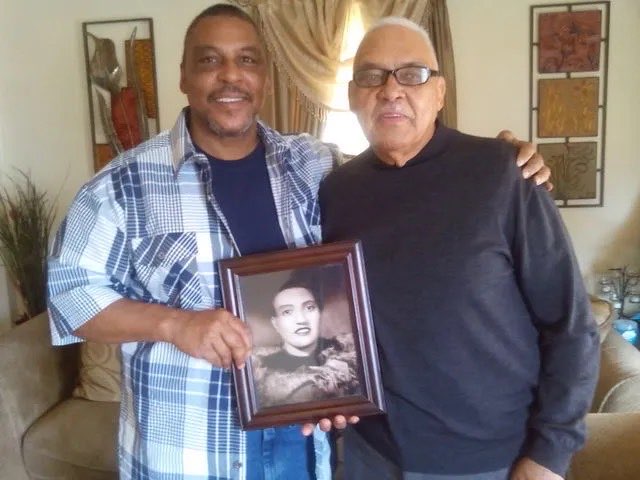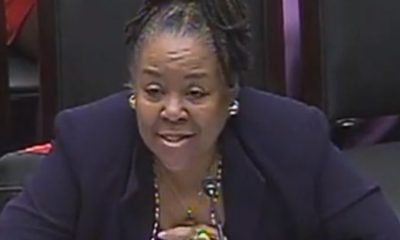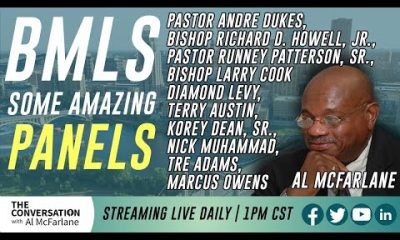#NNPA BlackPress
IN MEMORIAM: Remembering the life of Lawrence Lacks Sr.
By Aria Brent, AFRO Staff Writer, abrent@afro.com On Sept. 13 people gathered from far and wide at Faith Christian Fellowship to celebrate the life and legacy of Lawrence Lacks Sr. The patriarch of the Lacks family died from liver disease complications at the Baltimore VA Medical Center on Aug. 26. Lacks was 88 years old […]
The post IN MEMORIAM: Remembering the life of Lawrence Lacks Sr. first appeared on BlackPressUSA.

By Aria Brent,
AFRO Staff Writer,
abrent@afro.com
On Sept. 13 people gathered from far and wide at Faith Christian Fellowship to celebrate the life and legacy of Lawrence Lacks Sr. The patriarch of the Lacks family died from liver disease complications at the Baltimore VA Medical Center on Aug. 26.
Lacks was 88 years old and the last living child of Henrietta Lacks, a Black woman whose cervical cancer cells were taken without her permission or knowledge in 1951. Known as the “HeLa” cells, they went on to be used in a series of medical experiments and breakthroughs, including research to develop vaccines for polio, COVID-19 and in vitro fertilization.
“Lawrence’s life without a doubt is a testament to an enduring spirit of resilience, humility, love and respect,” said U.S. Rep. Kweisi Mfume, as he recalled Lacks’ life. “Lawrence, you went on to serve your country, distinguish yourself, be a small business owner, break barriers at Amtrak and never let go of the memories that so many of us shared in Turner Station. And you never let go of your commitment to make sure that your mother’s legacy would be honored.”
Lacks’ death came only three weeks after the family’s first legal settlement with the Massachusetts-based biotech company Thermo Fisher Scientific for profiting off the use of his mother’s cells.
The Lacks family moved to Maryland from Clover, Va., when Lawrence was just a young boy. They lived in Turner Station, one of the oldest Black communities in the Baltimore County area. Once his mother became ill and even before her death he was responsible for taking care of his younger siblings, but that was no task for him. He was remembered as a selfless, reliable and kind-hearted person.
“He was a stately man of great character and presence,” said the Rev. Dr. Franklin Lance, senior at Mt. Lebanon Baptist Church. “Lawrence made his days count. He made his voice and advocacy count. He made his patriarchal role count. He made his life count.”
“He was so grounded in his life, in his duties, his abilities and in who he was, that I often kept waiting for him to pull back his shirt so the ‘S’ would show,” Lance said, making a reference to the fictional hero Superman. “He was a man of accountability and he took his responsibilities seriously.”
The minister read the obituary for the homegoing ceremony and recapped the many accomplishments Lacks had throughout the years. He was a graduate of Baltimore City Public Schools and served in the U.S. Army as a medic. Once he returned home from serving in the military, he worked at Bethlehem Steel Yard and then went on the blaze trails at Amtrak by working as the first Black engineer for the national railroad passenger corporation.
On Feb. 26, 1962, he married his wife, Bobbette and they had three children, Ron, LaDonna and Lawrence Jr. Following his retirement from Amtrak, he and his wife opened a series of businesses, including an insurance agency, a confectionary store and Lacks Meats Palace. However, Lacks is most recognized for having spent the majority of his life relentlessly fighting for justice and ownership of his mother’s “HeLa” cells and, above all, his family’s name.
“What happened to Henrietta Lacks was a symptom of what happened to so many Blacks. What made them (the Lacks family) great was not her suffering; what made them great was that they would not allow her suffering to go unaddressed,” said the Rev. Al Sharpton during his eulogy of Lacks.
Lacks and his family spoke with the AFRO in 2017 to tell their side of the story regarding the fight for justice and Henrietta Lacks’ legacy.
There was a series of speakers at Lawrence Lacks’ service, and they all talked in grave detail about how personable and humble Lacks was despite his résumé of monumental achievements.
“You learn that God uses ordinary people to do extraordinary things and sometimes your familiarity to them robs you of their greatness. The Lacks family should not be taken for granted,” said Sharpton. “This man had endurance and tenacity in everything he did and he didn’t have to be a show-off to do it.”
Mfume shared similar sentiments, saying that Lacks had a timeless influence that will continue to be felt in the Baltimore community.
“Our community and our state have lost an unsung hero. A man of great character, strength and compassion. And in remembering him I hope and I pray that we will find a way to be comforted by words in the Bible,” Mfume said. “In John 14:2 [it says], ‘In my Father’s house are many mansions: if it were not so, I would have told you. I go to prepare a place for you. And if I go and prepare a place for you, I will come again, and receive you unto myself; that where I am, there ye may be also.’”
Lacks is survived by a plethora of family and friends including his six children, their spouses, and many grandchildren, great-grandchildren and extended family.
The post Remembering the life of Lawrence Lacks Sr. appeared first on AFRO American Newspapers .
This article originally appeared in The Afro.
The post IN MEMORIAM: Remembering the life of Lawrence Lacks Sr. first appeared on BlackPressUSA.
#NNPA BlackPress
IN MEMORIAM: Ramona Edelin, Influential Activist and Education Advocate, Dies at 78
NNPA NEWSWIRE — Born on September 4, 1945, in Los Angeles, California, activist Ramona Edelin’s early years were marked by a commitment to education and social justice. According to her HistoryMakers biography, after graduating from Fisk University with a Bachelor’s degree in 1967, she pursued further studies at the University of East Anglia in England. She earned her master’s degree before completing her Ph.D. at Boston University in 1981.
The post IN MEMORIAM: Ramona Edelin, Influential Activist and Education Advocate, Dies at 78 first appeared on BlackPressUSA.

By Stacy M. Brown, NNPA Newswire Senior National Correspondent
@StacyBrownMedia
Once upon a time, Black Americans were simply known as colored people, or Negroes. That is until Ramona Edelin came along. The activist, renowned for her pivotal roles in advancing civil rights, education reform, and community empowerment, died at her D.C. residence last month at the age of 78. Her death, finally confirmed this week by Barnaby Towns, a communications strategist who collaborated with Dr. Edelin, was attributed to cancer.
Born on September 4, 1945, in Los Angeles, California, Edelin’s early years were marked by a commitment to education and social justice. According to her HistoryMakers biography, after graduating from Fisk University with a Bachelor’s degree in 1967, she pursued further studies at the University of East Anglia in England. She earned her master’s degree before completing her Ph.D. at Boston University in 1981.
Edelin’s contributions to academia and activism were manifold. She was pivotal in popularizing the term “African American” alongside Rev. Jesse L. Jackson in the late 1980s.
Jackson had announced the preference for “African American,” speaking for summit organizers that included Dr. Edelin. “Just as we were called Colored, but were not that, and then Negro, but not that, to be called Black is just as baseless,” he said, adding that “African American” “has cultural integrity” and “puts us in our proper historical context.”
Later, Edelin told Ebony magazine, “Calling ourselves African Americans is the first step in the cultural offensive,” while linking the name change to a “cultural renaissance” in which Black Americans reconnected with their history and heritage.
“Who are we if we don’t acknowledge our motherland?” she asked later. “When a child in a ghetto calls himself African American, immediately he’s international. You’ve taken him from the ghetto and put him on the globe.”
The HistoryMakers bio noted that Edelin’s academic pursuits led her to found and chair the Department of African American Studies at Northeastern University, where she established herself as a leading voice.
Transitioning from academia to advocacy, Edelin joined the National Urban Coalition in 1977, eventually ascending to president and CEO. During her tenure, she spearheaded initiatives such as the “Say Yes to a Youngster’s Future” program, which provided crucial support in math, science, and technology to youth and teachers of color in urban areas. Her biography noted that Edelin’s efforts extended nationwide through partnerships with organizations like the National Science Foundation and the United States Department of Education.
President Bill Clinton recognized Edelin’s expertise by appointing her to the Presidential Board on Historically Black Colleges and Universities in 1998. She also co-founded and served as treasurer of the Black Leadership Forum, solidifying her standing as a respected leader in African American communities.
Beyond her professional achievements, Edelin dedicated herself to numerous boards and committees, including chairing the District of Columbia Educational Goals 2000 Panel and contributing to the Federal Advisory Committee for the Black Community Crusade for Children.
Throughout her life, Edelin received widespread recognition for her contributions. Ebony magazine honored her as one of the 100 Most Influential Black Americans, and she received prestigious awards such as the Southern Christian Leadership Award for Progressive Leadership and the IBM Community Executive Program Award.
The post IN MEMORIAM: Ramona Edelin, Influential Activist and Education Advocate, Dies at 78 first appeared on BlackPressUSA.
#NNPA BlackPress
Tennessee State University Board Disbanded by MAGA Loyalists as Assault on DE&I Continues
NNPA NEWSWIRE — Recent legislative actions in Tennessee, such as repealing police reform measures enacted after the killing of Tyre Nichols, underscore a troubling trend of undermining local control and perpetuating racist agendas. The new law preventing local governments from restricting police officers’ authority disregards community efforts to address systemic issues of police violence and racial profiling.
The post Tennessee State University Board Disbanded by MAGA Loyalists as Assault on DE&I Continues first appeared on BlackPressUSA.

By Stacy M. Brown, NNPA Newswire Senior National Correspondent
@StacyBrownMedia
Tennessee State University (TSU), the state’s only public historically Black college and university (HBCU), faces a tumultuous future as Gov. Bill Lee dissolved its board, a move supported by racist conservatives and MAGA Republicans in the Tennessee General Assembly, who follow the lead of the twice-impeached, four-times indicted, alleged sexual predator former President Donald Trump. Educators and others have denounced the move as an attack on diversity, equity, and inclusion (DE&I) and a grave setback for higher education.
Critics argue that TSU’s purported financial mismanagement is a manufactured crisis rooted in decades of underinvestment by the state government. They’ve noted that it continues a trend by conservatives and the racist MAGA movement to eliminate opportunities for Blacks in education, corporate America, and the public sector.
Gevin Reynolds, a former speechwriter for Vice President Kamala Harris, emphasizes in an op-ed that TSU’s financial difficulties are not the result of university leadership because a recent audit found no evidence of fraud or malfeasance.
Reynolds noted that the disbanding of TSU’s board is not an isolated incident but part of a broader assault on DE&I initiatives nationwide. Ten states, including Tennessee, have enacted laws banning DE&I policies on college campuses, while governors appointing MAGA loyalists to university trustee positions further undermine efforts to promote inclusivity and equality.
Moreover, recent legislative actions in Tennessee, such as repealing police reform measures enacted after the killing of Tyre Nichols, underscore a troubling trend of undermining local control and perpetuating racist agendas. The new law preventing local governments from restricting police officers’ authority disregards community efforts to address systemic issues of police violence and racial profiling.
The actions echo historical efforts to suppress Black progress, reminiscent of the violent backlash against gains made during the Reconstruction era. President Joe Biden warned during an appearance in New York last month that Trump desires to bring the nation back to the 18th and 19th centuries – in other words, to see, among other things, African Americans back in the chains of slavery, women subservient to men without any say over their bodies, and all voting rights restricted to white men.
The parallels are stark, with white supremacist ideologies used to justify attacks on Black institutions and disenfranchise marginalized communities, Reynolds argued.
In response to these challenges, advocates stress the urgency of collective action to defend democracy and combat systemic racism. Understanding that attacks on institutions like TSU are symptomatic of broader threats to democratic norms, they call for increased civic engagement and voting at all levels of government.
The actions of people dedicated to upholding the principles of inclusivity, equity, and justice for all will determine the outcome of the ongoing fight for democracy, Reynolds noted. “We are in a war for our democracy, one whose outcome will be determined by every line on every ballot at every precinct,” he stated.
The post Tennessee State University Board Disbanded by MAGA Loyalists as Assault on DE&I Continues first appeared on BlackPressUSA.
#NNPA BlackPress
Braxton Haulcy and the Expansion of Walker|West Music Academy
May 24, 2023 – Walker West Music Academy gets an early start on expansion. Join us for a Wednesday episode of The …
The post Braxton Haulcy and the Expansion of Walker|West Music Academy first appeared on BlackPressUSA.

May 24, 2023 – Walker West Music Academy gets an early start on expansion. Join us for a Wednesday episode of The …
The post Braxton Haulcy and the Expansion of Walker|West Music Academy first appeared on BlackPressUSA.
-

 Activism4 weeks ago
Activism4 weeks agoOakland Post: Week of March 27 – April 2, 2024
-

 #NNPA BlackPress4 weeks ago
#NNPA BlackPress4 weeks agoBeloved Actor and Activist Louis Cameron Gossett Jr. Dies at 87
-

 Community2 weeks ago
Community2 weeks agoFinancial Assistance Bill for Descendants of Enslaved Persons to Help Them Purchase, Own, or Maintain a Home
-

 Activism3 weeks ago
Activism3 weeks agoOakland Post: Week of April 3 – 6, 2024
-

 Business2 weeks ago
Business2 weeks agoV.P. Kamala Harris: Americans With Criminal Records Will Soon Be Eligible for SBA Loans
-

 Activism2 weeks ago
Activism2 weeks agoOakland Post: Week of April 10 – 16, 2024
-

 Community2 weeks ago
Community2 weeks agoAG Bonta Says Oakland School Leaders Should Comply with State Laws to Avoid ‘Disparate Harm’ When Closing or Merging Schools
-

 Community1 week ago
Community1 week agoOakland WNBA Player to be Inducted Into Hall of Fame

























































